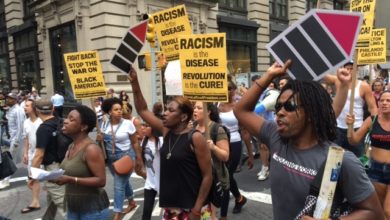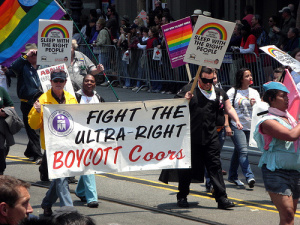
On the tail of the tremendous same sex marriage victory and with the 2016 U.S. elections fast approaching, the ruling class forces of the rich and powerful are now forced to decide how to relate to this historic moment in the LGBTQ struggle for equality.
Some candidates, mainly Democrats like Hillary Clinton, who only a short time ago refused to endorse marriage equality at all, are already rushing to pretend that they are lifelong allies of the movement. Others, right-wing bigots, will use their reactionary and false version of history as an attempt to incite more hatred and violence against LGBTQ people, and to sow divisions among all workers on the issue of civil rights.
The spectacular ruling by the U.S. Supreme Court, however, did not come about suddenly. Rather, the ruling was the result of a dramatic sea-change in public opinion on the issue of marriage equality, in response to decades of struggle carried out over decades in cities large and small.
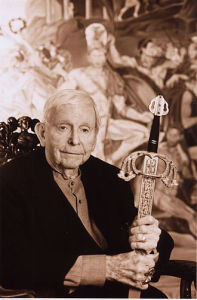
The struggle against Coors Beer, embodied in the Coors Beer Boycott that began in 1977 and continued through the Reagan years and beyond, is an important example of working class unity that took up the banner of LGBTQ rights through an unshakable alliance of gay activists and organizations, labor unions, immigrant rights groups and other anti-racist sectors, setting the basis for the unity that these movements share today.
Reagan’s breaking of the PATCO air traffic controllers union in 1981 exemplified the first shot in a huge offensive against labor and working people in general — in which the unions lost over 5 million members during those years.
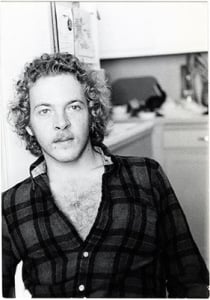
The Coors Beer Boycott was a counter-offensive of the people against Reagan’s anti-labor offensive — one of the most wide-spread and militant labor struggles in decades. In 1977, ferociously anti-union Coors Beer moved to smash the union after a strike of nearly 1,500 workers in 1977. Part of the anti-union campaign was to fire without cause workers suspected of being lesbian, gay, bisexual, trans, or queer from its Colorado-based brewery.
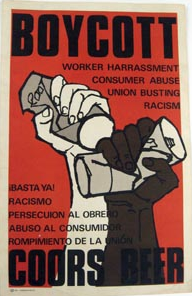
At the same time, the Coors family was the funding power behind anti-immigrant legislation in Colorado, California and other states. A large number of the union fighters at Coors were immigrants from Mexico. For years there was no women’s bathroom at the Coors Brewery as management refused to hire women. Workers who applied for positions at Coors underwent lie detector tests in which they were asked their opinions about collective bargaining and if they were homosexual.
In 1975 Coors reluctantly agreed not to discriminate against Blacks, Latinos and women after a settlement was reached under the federal Equal Employment Opportunity Commission (EEOC) lawsuit against Coors. Joseph Coors, a founder of the right-wing think-tank, the Heritage Foundation, became the corporate poster-child for the Reagan administration and the target of an unprecedented united fightback movement—a new movement that concurrently emerged along with the AIDS movement and after the first march for LGBTQ rights in Washington, D.C. in 1979. The alliance of these forces at the time laid the basis for the current united movement of today.
Morris Kight and Scott Smith, two exemplary leaders
Morris Kight is recognized by many as one of the founding members of the modern day LBGTQ movement. Kight was a close collaborator with Harry Hay. Both men are credited with forming the Mattachine Society. Along with the Daughters of Bilitis, a lesbian rights organization, Mattachine was one of the first gay rights organization in the U.S.
Harry Hay was a communist activist, labor organizer, anti-war, anti-racist fighter, and advocate for Native Rights. Morris Kight was a close collaborator with several organizers who today are members of the Party for Socialism and Liberation.
Kight was never a narrow gay rights advocate. His work as early as the 1940 included in many civil rights and labor actions. Along with forming the Mattachine Society, he also organized the Dow Action Committee in 1967, organizing protests against the Dow Chemical company for producing Agent Orange used against the people of Vietnam in the U.S. war of aggression in Southeast Asia.
But perhaps, Kight was best known in his role for linking the LGBTQ rights movement at the time with the larger people’s counter offensive against the right-wing, when he called a powerful demonstration at Outfest, a gay and lesbian film festival, in 1977, after organizers for the LGBTQ social event accepted funding from Coors Beer. He used the opportunity to educate the LGBTQ community about the racist, anti-labor and anti-LGBTQ practices of Coors Beer, forging a new alliance that succeeded in banning Coors Beer forever from the event. Although other organizations later called an end to the boycott of Coors Beer, the boycott continues until today, where it is virtually impossible to find a gay bar selling Coors Beer.
As Kight was pushing back the bigots in Southern California, activist Scott Smith, born in Florida and raised in Mississippi, took to the front lines of the Coors Beer boycott in San Francisco.
Scott Smith’s name may not be recognizable to many. He had a romantic relationship with Harvey Milk, the first openly gay elected official in the United States, who won a seat on the San Francisco City Council in 1977. Milk was assassinated by the bigoted ex-cop Dan White the next year.
Scott Smith, however, played an important role in Milk’s own political development and remained an ally and friend of Milk even after their relationship ended. Smith brought the Coors Boycott to Harvey Milk’s attention, who used his position as an openly gay elected official to push forward the labor/LGBTQ/immigrant alliance that was forming in the Bay Area at the time through the militancy of the Coors Boycott.
Gay activists at the time secured full agreement of gay establishments not to sell Coors Beer, dramatically dumping Coors beers down the drain and into the streets. These actions, orchestrated by Smith, spread to securing the boycott in LGBTQ venues across the country.
Smith died in 1995 of AIDS-related pneumonia at the age of 46.
There were many others in the LGBTQ movement who played key roles, such as Howard Wallace, an openly gay Teamster who helped establish the the labor-LGBTQ alliance; and of course, and the untold number of rank and file community members who would not support any establishment that served Coors Beer or any of their products.
Coors Beer did not just sit there in the face of this this new united movement. Coors tried tooth and nail to split up this emerging powerful alliance of Blacks, Latinos, immigrants, women and LGBTQ community activists who stood together shoulder to shoulder no matter what.
In 1984, Arthur Osborn, Pres. of the Massachusetts AFL-CIO, denounced Coors at the University of Massachusetts at Amherst, and the students soon thereafter banned the beer from campus. The momentum of the labor movement in general was a forward march to smash Coors and send a signal to racists, bigots and anti-labor companies. Even the non-AFL-CIO National Education Association with nearly 2 million members was pressured by its members to support the boycott of Coors.
Coors appealed to the African American community with promises of $650 million in community investments and jobs, but less than 5 percent of that was accepted by members of the Black community, who, due to the struggle, were aware of Coors’ virulent racism.
As the boycott grew and more and more joined the campaign and picked up the banner, the movement in different parts of the U.S. learned from each other and saw, in a mass way, that unity, unshakable unity, is key in winning victories. Campaigns such as the Coors Beers Boycott nurtured allies for the LGBTQ movement that propelled it forward to where it has won tremendous concessions today. We can continue to win even more, and push forward, recognizing how the movement has been built thus far through unity and militant struggle.




